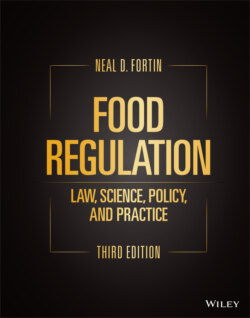Читать книгу Food Regulation - Neal D. Fortin - Страница 118
NOTES AND QUESTIONS
Оглавление1 3.5 What brought down LFTB? What can industry do to avoid being at the mercy of the next consumer scare?
2 3.6 Transparency. If the LFTB had been listed in the ingredient statement from the start, what would the effect have been on the consumer backlash? Would there have been a difference in the media?
3 3.7 Compare and contrast. What parallels can you see between the Federation of Homemakers v. Butz case and the pink slime situation? What differences?
4 3.8 Food libel laws (also known as food disparagement laws). A number of states have passed laws making it easier to sue for libel in cases where someone makes disparaging comments about a food. In 1996, Oprah Winfrey’s guest on her show, Howard Lyman, discussed a possible link between “mad cow disease” in cattle and a fatal degenerative brain disease in humans. Oprah Winfrey said that it had just stopped her “cold from eating another burger.” Ten people had just died in Britain. Members of the studio audience gasped when Lyman explained how rendered beef tissue was fed back to cattle in their feed. Winfrey and Lyman were sued under the Texas food disparagement law (Tex. Civ. Prac. & Rem. Code § 96.002) and common law business disparagement in Texas Beef Group, et al. v. Oprah Winfrey, et al., 11 F. Supp. 2d 858 (N.D. Tex. 1998). On announcement of a verdict in her favor, Oprah Winfrey said, “Free speech rocks!”
